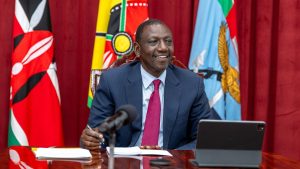Kenya’s Energy Sector Looks to Nuclear Power by 2034, Says PS Wachira

Kenya's Energy Sector Looks to Nuclear Power by 2034, Says PS Wachira
Energy Principal Secretary Alex Wachira has said that Kenya is embarking on an ambitious journey to incorporate nuclear power into its energy mix by the year 2034
This significant announcement was made during his representation of the State Department for Energy at the Korea-Africa Economic Cooperation (KOAFEC) Ministerial conference held in Busan, South Korea.
Energy PS Wachira shared this transformative vision on social media, emphasizing the Ministry’s commitment to integrating nuclear energy as a core component of Kenya’s energy infrastructure to complement its existing geothermal and hydro power sources.
During the conference, Wachira announced a successful meeting with Dr. In Cheol Lim of the Korean Atomic Energy Research Institute (KAERI).

Both parties agreed to strengthen the Kenya-Korea relationship in various aspects, including conducting feasibility studies on Kenya’s renewable energy potential in Solar, Wind, and Geothermal sources, as well as providing capacity building and training programs in nuclear energy development in counties such as Kilifi and Kwale.
“Kenya and Korea will work closely in regards to conducting feasibility studies on Kenya’s renewable energy potential in Solar, Wind and Geothermal as well as in conducting capacity building and training of people in nuclear energy development in Counties such as Kilifi and Kwale counties,” Wachira said.
Wachira affirmed that the ministry has set its sights on achieving nuclear energy production by 2034, which will play a pivotal role in supporting Kenya’s base load energy needs in conjunction with geothermal and hydro power sources.

This endeavor will be made possible through collaboration with Korean institutions.
Notably, the Nuclear Power and Energy Agency (NuPea) had already paved the way for Kenya’s nuclear future by selecting Kilifi and Kwale as prime locations for the country’s first nuclear power generator.
According to NuPea Director of Nuclear Energy Infrastructure Development Eric Ohaga in past interview, construction is set to commence in 2030, with a test run scheduled for 2034 and full operations anticipated by 2036.
Currently, only a select group of countries, including China, Japan, Russia, the United States, France, and South Korea, possess the technological capacity to construct nuclear power plants.
In Africa, South Africa stands as the sole country with an operating nuclear power plant, which has been operational since 1984.
In a regional context, Uganda made strides in harnessing nuclear technology for energy, medical, and other peaceful purposes by signing agreements with Russia in 2019.




